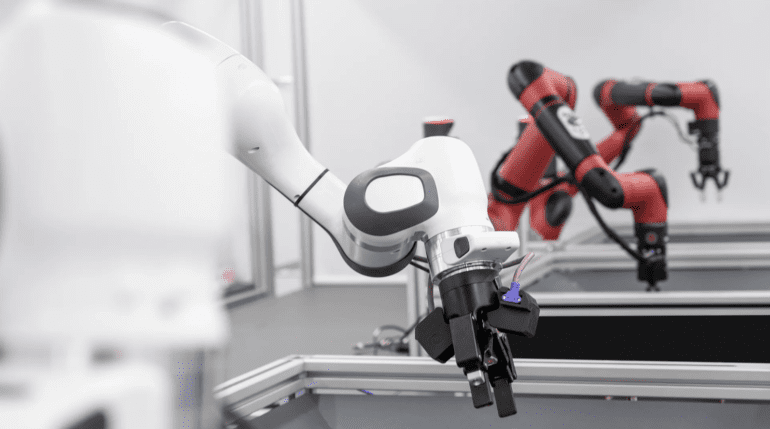TL;DR:
- Google’s DeepMind introduces an autonomous robot agent called RoboCat that can learn and solve various tasks without human supervision.
- RoboCat learns from its own actions and improves its problem-solving techniques using real-world robotic systems.
- Data generated from the robot’s actions allow the AI to enhance its skills and transfer knowledge to other robots.
- DeepMind’s technology represents significant progress in building general-purpose robots for everyday tasks.
- RoboCat surpasses other models in learning speed, requiring as few as 100 demonstrations to acquire new tasks.
- The AI-powered robot trained itself to perform 253 tasks across four types of robots and can adapt to different robotic configurations.
- The development of self-teaching robotic systems like RoboCat contributes to the realization of domesticated robots, promising a transformative impact on various industries.
Main AI News:
In a groundbreaking development, Google’s AI division, DeepMind, has introduced an impressive technological feat—an autonomous robot agent capable of self-improvement without the need for human supervision. The newly unveiled RoboCat AI model signifies a significant leap forward in the realm of robotics, as it has become the first of its kind to master a wide range of tasks using real-world robotic systems, including robotic arms.
The key to RoboCat’s success lies in its ability to learn from its own actions and subsequently enhance its problem-solving techniques. By leveraging the data generated from its interactions, this advanced AI can refine its skills and transfer its newfound knowledge to other robotic platforms. With this innovative approach, DeepMind, the London-based company acquired by Google in 2014, aims to pave the way for the development of general-purpose robots capable of seamlessly performing everyday tasks.
According to DeepMind’s researchers, RoboCat surpasses other state-of-the-art models in terms of learning speed. With a minimal requirement of just 100 demonstrations, this remarkable AI agent can effortlessly acquire new tasks. Such efficiency is attributed to RoboCat’s vast and diverse dataset, which fuels its rapid learning process. By minimizing the need for human-guided training, this technological breakthrough promises to accelerate advancements in robotics research, ultimately bringing us closer to the realization of a truly versatile and adaptable robot.
RoboCat draws inspiration from DeepMind’s renowned AI model, Gato, which assimilates knowledge by analyzing textual information, images, and real-life events. In the case of RoboCat, researchers provided demonstrations of a human-controlled robot arm performing a variety of tasks, such as fitting shapes through holes and manipulating different fruits. After this initial training phase, RoboCat embarked on a journey of autonomous improvement, repeating each task an average of 10,000 times without any human intervention.
During DeepMind’s experiments, the AI-powered RoboCat accomplished an impressive repertoire of 253 tasks across four distinct types of robots. Notably, it even demonstrated the ability to adapt its training to accommodate a transition from a two-fingered to a three-fingered robot arm. With further refinements, the researchers believe that RoboCat can conquer previously uncharted tasks, further highlighting its potential for continuous growth and adaptability.
DeepMind’s blog post explains that RoboCat’s training process follows a virtuous cycle—learning new tasks enhances its ability to acquire additional new tasks. This phenomenon mirrors the way humans develop a broader range of skills as they delve deeper into a specific domain of expertise. By capitalizing on its ever-expanding breadth of experience, RoboCat continues to push the boundaries of autonomous learning, bringing us closer to a future where robots possess an unprecedented range of capabilities.
This recent breakthrough in self-teaching robotic systems is part of a larger trend within the field. Researchers from Carnegie Mellon University have also demonstrated their success in developing a robot that can learn new skills by observing humans perform tasks in videos. For instance, their robot quickly mastered the art of opening drawers and safely handling knives to prepare fruit, accomplishing each household chore in a mere 25 minutes.
Conclusion:
The unveiling of DeepMind’s RoboCat AI robot marks a significant milestone in the field of robotics. Its autonomous learning capabilities, surpassing other models in speed and efficiency, pave the way for the development of general-purpose robots capable of performing everyday tasks. This breakthrough has substantial implications for the market, as it reduces the need for human-supervised training and accelerates robotics research. The potential for intelligent, self-teaching robots opens up new possibilities for industries ranging from manufacturing and logistics to healthcare and home automation. As these technologies continue to advance, we can expect a transformative impact on the market, enabling more versatile and adaptable robotic solutions that redefine the way we live and work.

